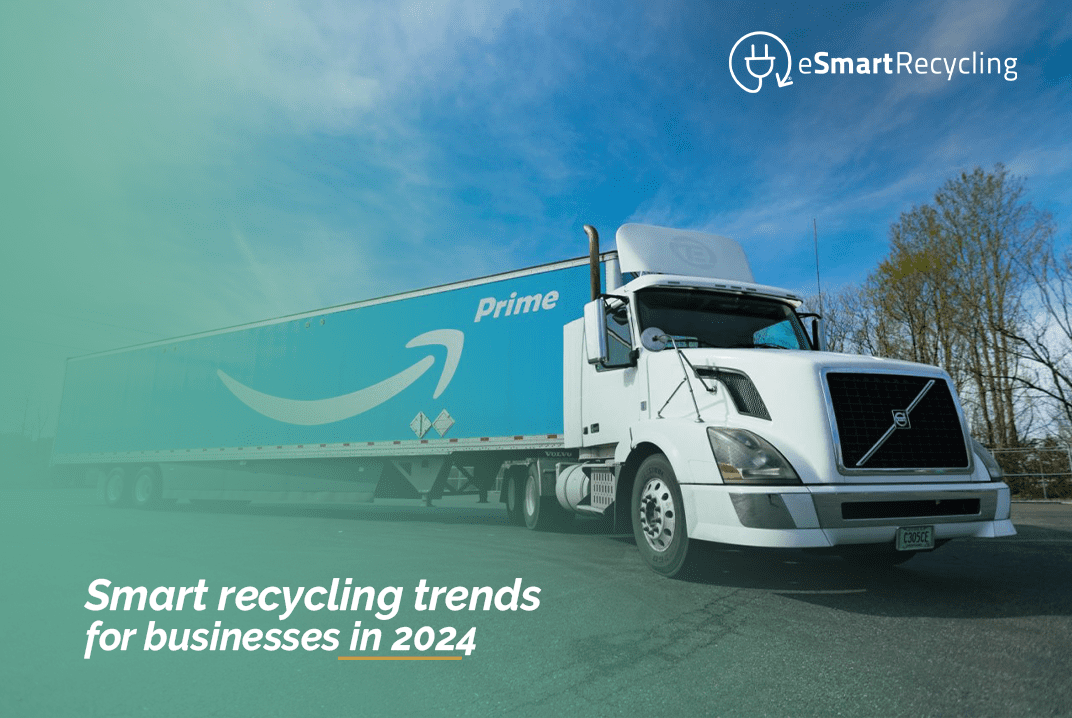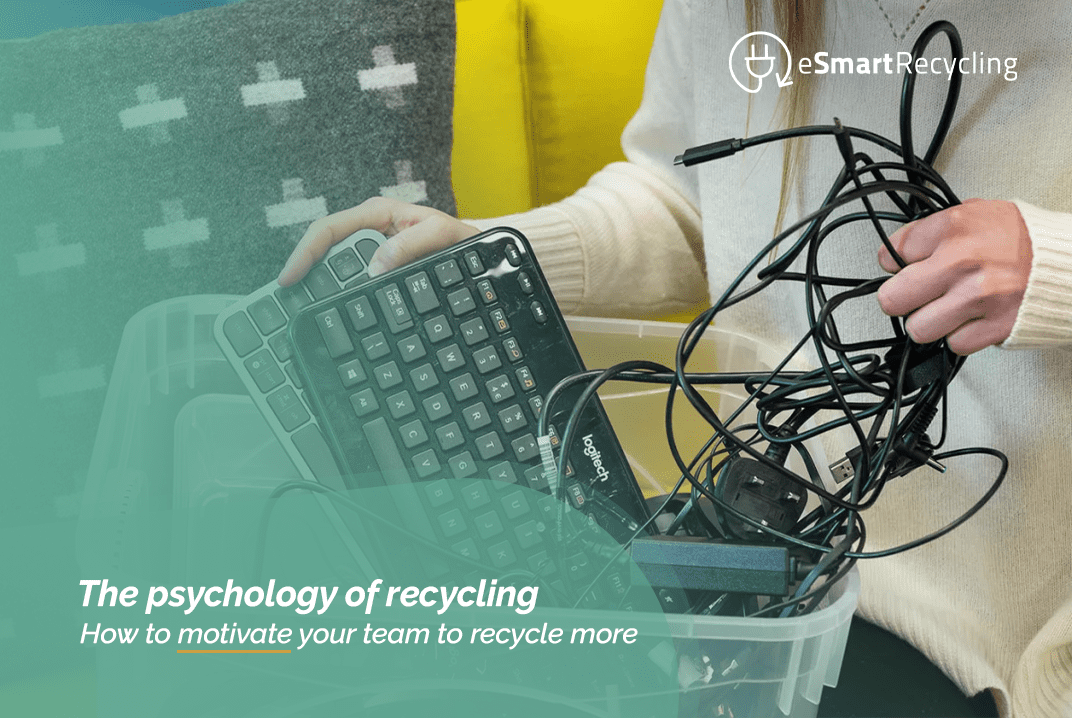
eSmart
Recycling
Securely manage and recycle technology to sustainably maximize and measure social impact.
#eSmartWay

What best describes you?
Business / Institutional
IT Asset Management and Disposition Services that fit your needs.
Nonprofits
A sustainable source of refurbished computers for the kids and families you serve
Residential
Recycle your old electronics, and join the E-Revolution
Discover the
eSmart way
It's always a win-win-win
and let’s create one together.
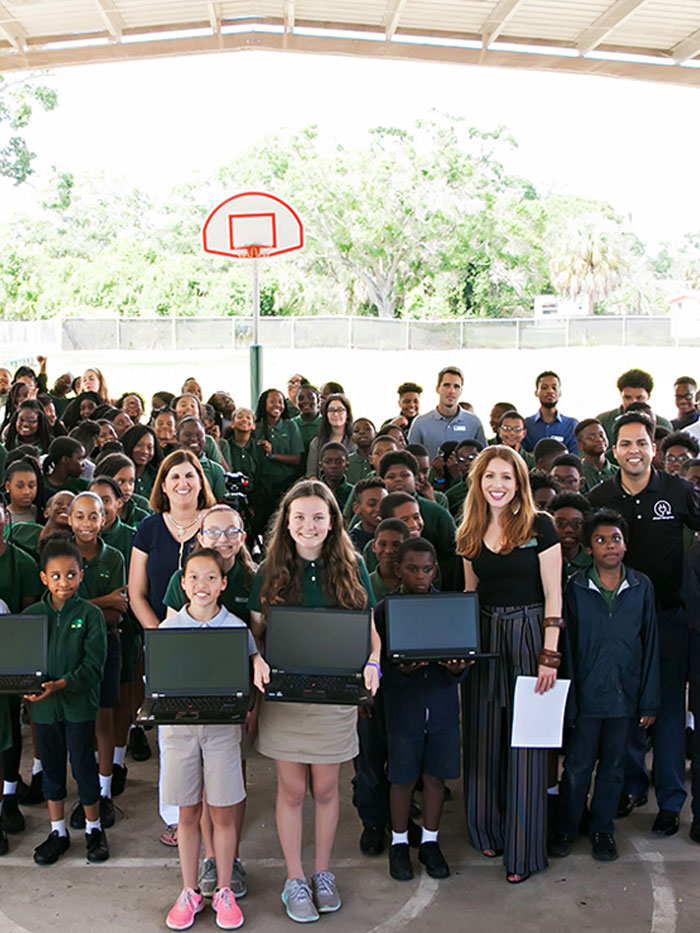
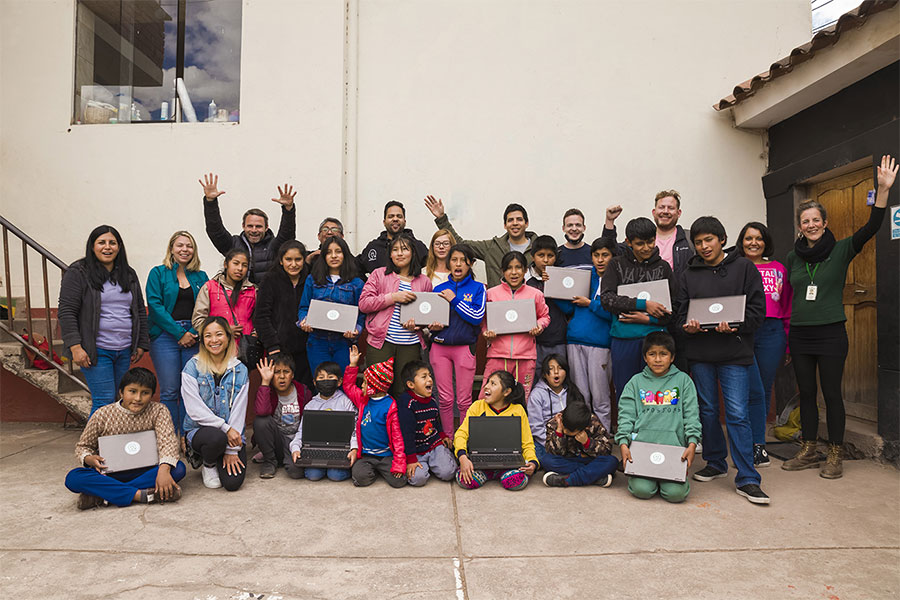





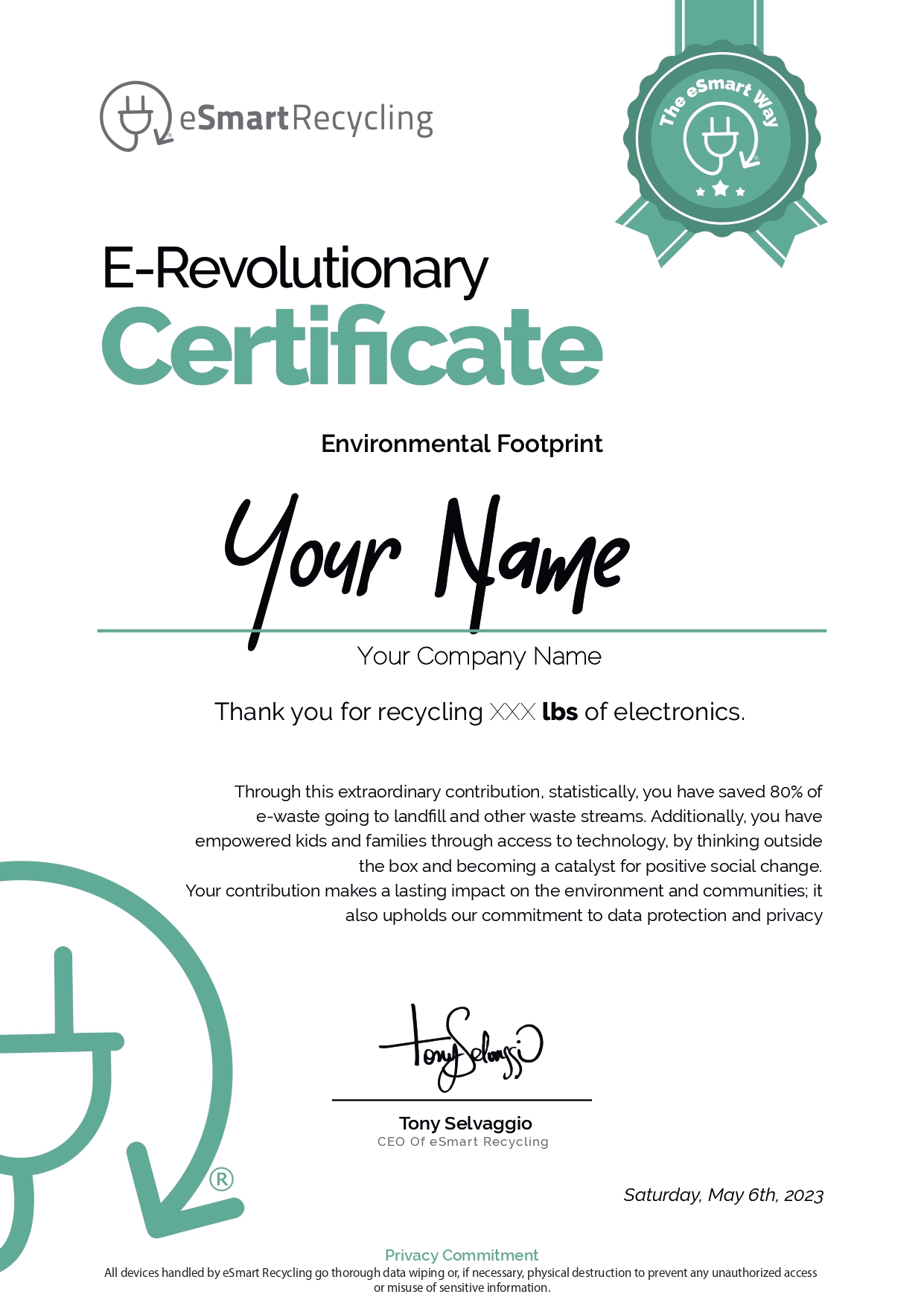
Measure and showcase
your environmental and social impact
Keep track of the efforts in real-time through your partner portal.
Do you need customized reporting for your ESG requirements? We create bespoke plans to fit your needs.
Highest complience standarts
for data security and recycling
Your data security is one of our biggest priorities. We are 100% committed to protecting your personal and business information, IT assets, and business interests.
At eSmart Recycling, we understand our customers need to focus on what they do best, and that’s why they rely on us to get the job done, right. We provide a transparent full chain of custody as we manage the process of recycling, reuse, recovery, and retirement of electronic material at the highest compliance standards.
For more information about standards, certificates and compliance requirements, please contact us directly.
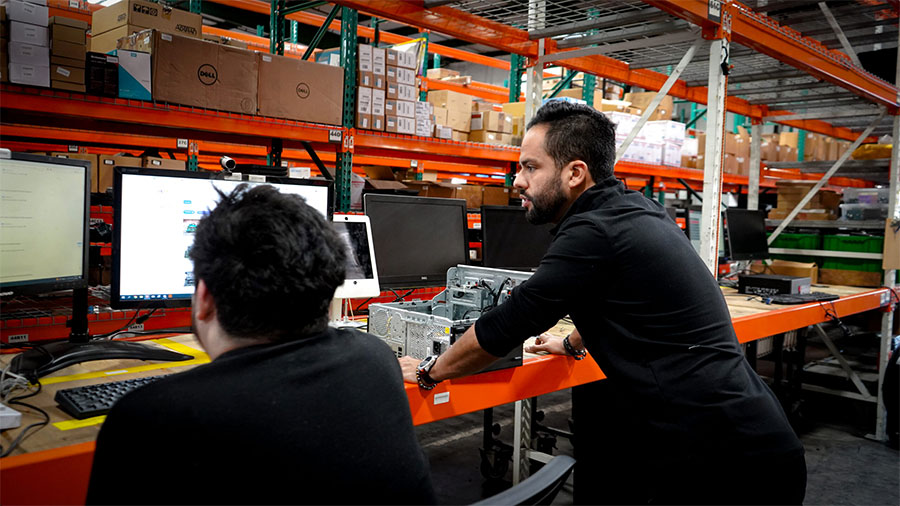
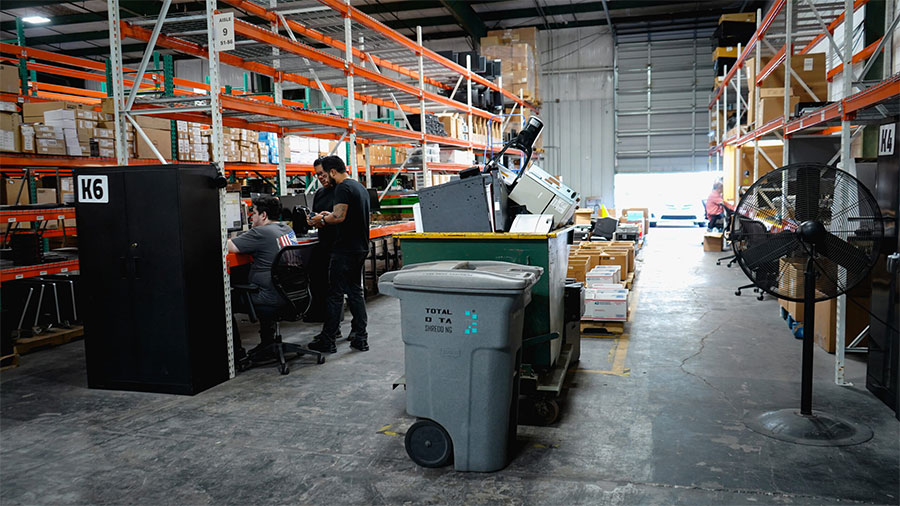
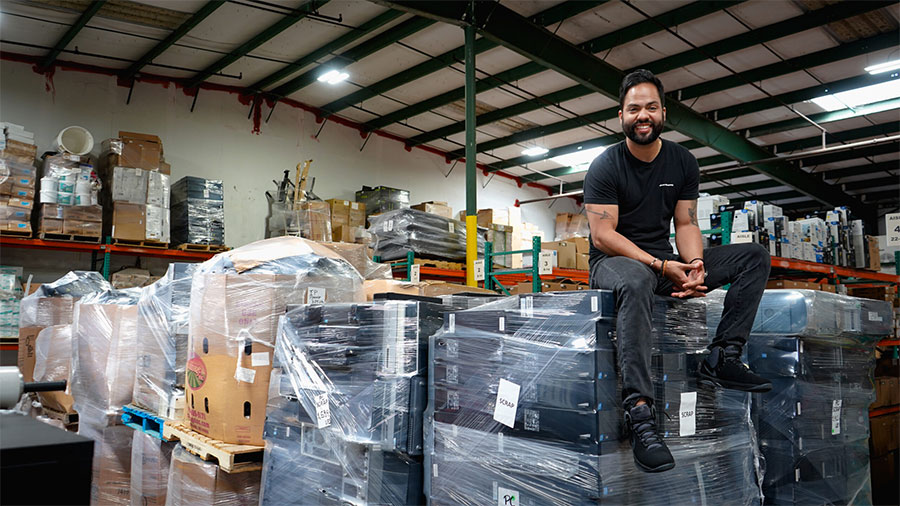
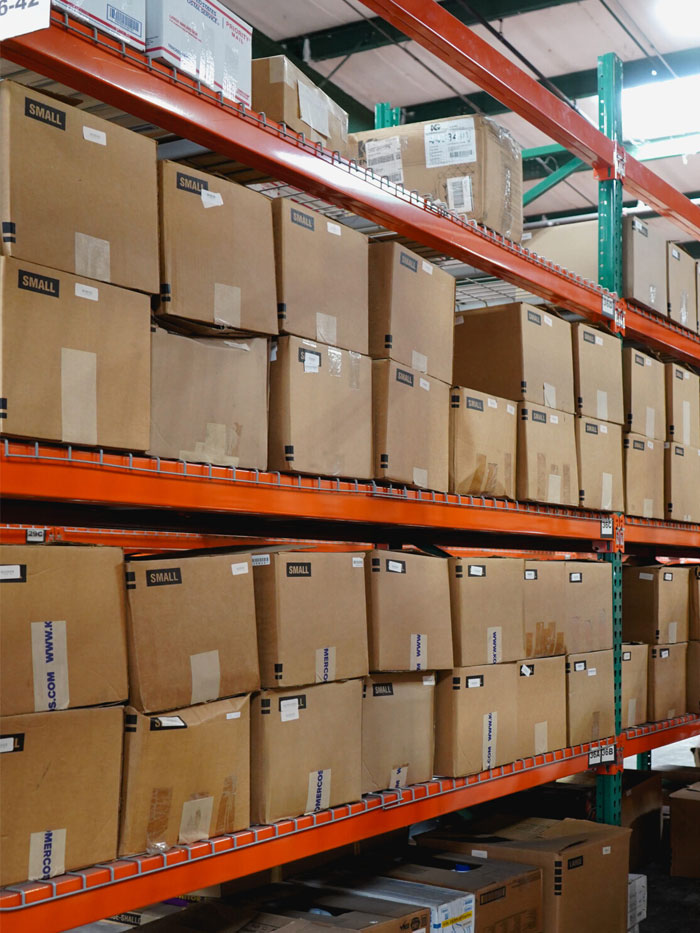
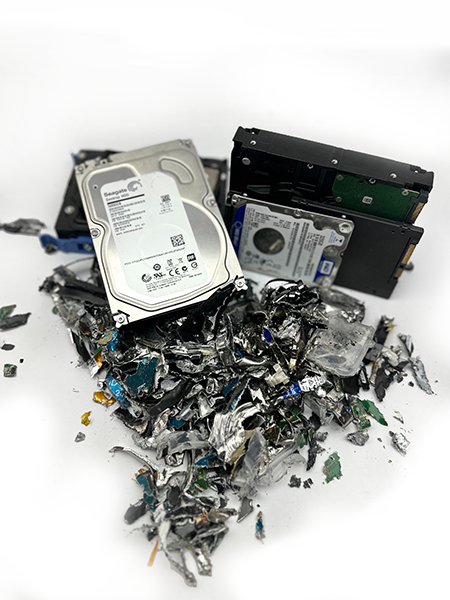
How does the
process work
1.
Equipment Collection: We take care of all the logistics.
2.
Audit and Inventory: Our robust inventory process takes account of every piece of equipment we collect, and we report it back to you.
3.
Data Destruction: We are your last line of defense. Here is when we remove hard drives and other data or media-containing devices and destroy them.
4.
Assessment: Here's where we find the best ways we have to monetize and generate impact with the material that was picked up.
5.
Partner Report: You'll receive access to your partner portal, where you will see exactly all documentation from each pick-up, such as your audit report, and certificate of data destruction. You will know your environmental footprint.
6.
Deployments and social impact: About 20% of our proceeds go towards funding computers for kids and families worldwide who don't have access to technology in partnership with the Digital Education Foundation.
Featured in:
![logos2[1]-04](https://esmartrecycling.com/wp-content/uploads/2023/09/logos21-04.png)
![logos2[1]-07](https://esmartrecycling.com/wp-content/uploads/2023/09/logos21-07.png)
![logos2[1]-08](https://esmartrecycling.com/wp-content/uploads/2023/09/logos21-08.png)
![logos2[1]-09](https://esmartrecycling.com/wp-content/uploads/2023/09/logos21-09.png)
![logos2[1]-10](https://esmartrecycling.com/wp-content/uploads/2023/09/logos21-10.png)
![logos2[1]-12](https://esmartrecycling.com/wp-content/uploads/2023/09/logos21-12.png)
![logos2[1]-13](https://esmartrecycling.com/wp-content/uploads/2023/09/logos21-13.png)
![logos2[1]-14](https://esmartrecycling.com/wp-content/uploads/2023/09/logos21-14.png)
![logos2[1]-18](https://esmartrecycling.com/wp-content/uploads/2023/09/logos21-18.png)
![logos2[1]-11](https://esmartrecycling.com/wp-content/uploads/2023/09/logos21-11.png)



+ 10,000
Kids and families now have access to technology because of our joint efforts
+ 10,000
Kids and families now have access to technology because of our joint efforts
+ 10,000
Kids and families
now have access to technology
because of our joint efforts
Join us in making the world a better place
As we continue to evolve, we are understanding that equality of opportunities across the board must be a priority on everyone’s agenda. Humanity’s biggest threat right now is the lack of sustainable access to basic human rights, such as education, and technology. It is our responsibility to lead by example, to think outside the box, and to work together to solve the problems our community is facing. It starts with an old computer. Are you ready to join the E-Revolution?

Tony Selvaggio, CEO

Our team
Awesome people great results
Together we can make a difference, and our team is the driving force that turns ideas into reality.


Walter
Test Bench Specialist


Fernando
Packing Specialist.


Ronald
Route Specialist


Luis
Warehouse Manager


Antonio
e-Commerce Sales Specialist


Jose
SEO & Community Manager
We take action
Because we care
Adults will have had no education beyond primary school by 2030 – Gordon Brown.
about 80% of electronics end up in a landfill and contaminate the earth, according to the E.P.A.
Of our proceeds are used to fund the refurbishment of computers and deploy them through our amazing distribution partners.
A single computer we deploy through our programs reaches 4 people on average.

Our blog
Recent News & articles
Stay up to date on what we are doing in the community along with our partners, and other relevant information in the world of technology, and sustainability.
May 16, 2024
Biodiversity has always been a crucial component of the environment. It has been a defining feature of the natural world, and its value cannot be overstated. Therefore, the field of biodiversity has become intertwined with the business world. Both have endless links that can be seen in how biodiversity influences and shapes business activities. This article will explore the main connections between biodiversity and business and why companies should care about improving and protecting biodiversity.
The benefits of biodiversity for businesses
Biodiversity offers a range of benefits to businesses. For example, it contributes to producing goods and services, supports the stability of ecological systems, and helps business leaders find innovative solutions, among other things. Biodiversity also helps businesses respond to market changes and reduces the risks associated with businesses based on natural resources, such as agriculture, fishing, mining, and forestry.
The negative impact of business activities on biodiversity
However, businesses also impact biodiversity. Their activities can reduce the number of species, disrupt ecological processes, and introduce non-native species in Western countries. These impacts can lead to the complete loss of entire ecosystems and the extinction of species, which can have far-reaching consequences for business activities.
For example, biodiversity loss can destabilize the natural foundations that support businesses and their related industries. This can result in decreased profitability, lower environmental and social performance, and increased legal and market risks.
Businesses that care about biodiversity
In recent years, businesses have become increasingly aware of the importance of biodiversity and have undertaken a series of actions to address it. Many global businesses have implemented policies and practices to enhance biodiversity, including operations, supply chains, and local communities. For example, natural resource extraction companies have begun implementing sustainable practices such as reforestation and conservation. Additionally, some businesses have started investing in reserves and natural parks as part of their corporate social responsibility efforts.
What can businesses do to protect biodiversity?
If businesses want to protect and enhance biodiversity, they can take several measures. For example, they can increase the transparency of their operations and supply chain to facilitate identifying and tracking impacts and outcomes on biodiversity. They can also provide training and education to their suppliers, customers, and employees on biodiversity-related issues. Additionally, businesses can adopt and implement legal and voluntary standards and guidelines to support biodiversity conservation and sustainable use.
A great example of a company taking active measures to protect biodiversity is Unilever, the global consumer goods company. The company has an extensive corporate sustainability program includes commitments to reduce its environmental impact and initiatives to protect biodiversity. The company has collaborated with local communities and NGOs to promote wildlife and flora conservation, restore habitats, and plant over 1,000,000 trees to increase biodiversity.
Protecting and enhancing biodiversity has become an important part of business activity. Companies have only begun to scratch the surface regarding the positive effects they can have on biodiversity. Moreover, protecting biodiversity is the right thing to do and can have real business implications. By taking the right steps, businesses can better understand and anticipate ecosystem responses to their activities and identify opportunities for developing new businesses and products. The bottom line is that businesses that care about protecting biodiversity can improve their environmental outcomes and increase competitiveness.
May 16, 2024
Biodiversity has always been a crucial component of the environment. It has been a defining feature of the natural world, and its value cannot be overstated. Therefore, the field of biodiversity has become intertwined with the business world. Both have endless links that can be seen in how biodiversity influences and shapes business activities. This article will explore the main connections between biodiversity and business and why companies should care about improving and protecting biodiversity.
The benefits of biodiversity for businesses
Biodiversity offers a range of benefits to businesses. For example, it contributes to producing goods and services, supports the stability of ecological systems, and helps business leaders find innovative solutions, among other things. Biodiversity also helps businesses respond to market changes and reduces the risks associated with businesses based on natural resources, such as agriculture, fishing, mining, and forestry.
The negative impact of business activities on biodiversity
However, businesses also impact biodiversity. Their activities can reduce the number of species, disrupt ecological processes, and introduce non-native species in Western countries. These impacts can lead to the complete loss of entire ecosystems and the extinction of species, which can have far-reaching consequences for business activities.
For example, biodiversity loss can destabilize the natural foundations that support businesses and their related industries. This can result in decreased profitability, lower environmental and social performance, and increased legal and market risks.
Businesses that care about biodiversity
In recent years, businesses have become increasingly aware of the importance of biodiversity and have undertaken a series of actions to address it. Many global businesses have implemented policies and practices to enhance biodiversity, including operations, supply chains, and local communities. For example, natural resource extraction companies have begun implementing sustainable practices such as reforestation and conservation. Additionally, some businesses have started investing in reserves and natural parks as part of their corporate social responsibility efforts.
What can businesses do to protect biodiversity?
If businesses want to protect and enhance biodiversity, they can take several measures. For example, they can increase the transparency of their operations and supply chain to facilitate identifying and tracking impacts and outcomes on biodiversity. They can also provide training and education to their suppliers, customers, and employees on biodiversity-related issues. Additionally, businesses can adopt and implement legal and voluntary standards and guidelines to support biodiversity conservation and sustainable use.
A great example of a company taking active measures to protect biodiversity is Unilever, the global consumer goods company. The company has an extensive corporate sustainability program includes commitments to reduce its environmental impact and initiatives to protect biodiversity. The company has collaborated with local communities and NGOs to promote wildlife and flora conservation, restore habitats, and plant over 1,000,000 trees to increase biodiversity.
Protecting and enhancing biodiversity has become an important part of business activity. Companies have only begun to scratch the surface regarding the positive effects they can have on biodiversity. Moreover, protecting biodiversity is the right thing to do and can have real business implications. By taking the right steps, businesses can better understand and anticipate ecosystem responses to their activities and identify opportunities for developing new businesses and products. The bottom line is that businesses that care about protecting biodiversity can improve their environmental outcomes and increase competitiveness.
May 16, 2024
For today’s businesses, sustainability amid rapidly advancing technology and an increased focus on environmental respect has become essential. Companies of all sizes are turning to recycling techniques to reduce their environmental impact and identify potential cost savings. Therefore, this article will outline the recycling trends likely to take center stage in 2024, exploring how businesses can stay ahead of the curve and effectively implement these strategies.
An overview of smart recycling trends for 2024
Sustainability efforts have gained momentum in recent years, with brands and consumers increasingly seeing the benefits of doing their part to save the planet. This means that many businesses will look for new and innovative ways to enhance their eco-credentials in 2024, focusing on efforts that produce significant benefits with minimal investment.
This includes ideas such as extending product lifecycles, designing packaging optimized for recycling, and examining energy source usage more closely.
Extending product lifecycles
An easy win for businesses in 2024 is to extend the lifecycle of their products, reducing the energy production needed for manufacturing and shipping processes. This can be achieved by considering the design of furniture, appliances, and electronic devices when manufacturing, focusing on robustness, energy efficiency, and reuse. Brands like Dell and Apple have already embarked on this path, offering a range of recycled plastics and other sustainable materials as part of their product portfolio.
Optimizing packaging
It is estimated that packaging accounts for 30% of household waste, leading many businesses to examine their materials more closely and consider how they could reduce their environmental impact. Innovative solutions include biodegradable plastics, the search for alternative and lighter materials, and reusable and recyclable packaging expansion.
Companies like Lego and Coca-Cola have successfully launched such initiatives, with new packaging materials allowing for more environmentally sustainable product designs.
Maximizing energy efficiency
In 2024, businesses will likely seek ways to optimize energy consumption as part of their broader sustainability strategies. This could involve investing in new energy efficiency technologies, such as solar panels, water-saving technology, and LED lighting for large companies. These efforts could extend beyond the office and include operations like logistics. For example, companies like Amazon are exploring more carbon-efficient transportation routes.
Implementing smart recycling solutions
In addition to reducing energy and material consumption, businesses are expected to invest in smart recycling solutions in 2024. This could mean implementing more effective waste management processes like sorting, collection, and storage. Additionally, many companies are beginning to explore the use of new technologies, such as drones and Artificial Intelligence (AI), to help identify potential materials that can be recycled. This has already been seen in action, from companies like Adidas, which has adopted a more circular economy approach, to new tech companies like Recovibes, which is developing technology to identify products for recycling.
The benefits of smart recycling for businesses
The potential benefits of smart recycling strategies in 2024 are enormous and go well beyond environmental benefits. Recyclable materials like aluminum, steel, paper, and cardboard can be turned into new and valuable products, offering businesses significant material savings. Moreover, businesses increasingly realize that, as consumers emphasize sustainability, those advertising environmentally friendly products and practices can gain a competitive advantage and maintain customer loyalty, as with brands like Patagonia and IKEA.
Getting started with environmental sustainability
When businesses try to improve their sustainability efforts in 2024, there is a plethora of resources that can help them get started. Sustainability organizations such as the Sustainable Packaging Coalition, the Ellen MacArthur Foundation, and the Business Recycling Council offer useful resources to companies that want to implement smart recycling strategies. Many jurisdictions also offer aid and grants to businesses that take steps to be more environmentally friendly, which means they can save significant costs.
Sustainability is becoming increasingly important for businesses of all sizes and sectors. In 2024, many businesses will try to invest in smart recycling trends to meet the demands of modern consumers and regulatory requirements. By extending product lifecycles, improving packaging, maximizing energy efficiency, and applying smart recycling solutions, businesses can reduce their environmental impact, identify significant cost savings, and even gain a competitive edge.
May 16, 2024
Climate change, environmental pollution, and the depletion of natural resources are just a few reasons why today’s companies prioritize environmental protection. Indeed, recycling is an eco-friendly way to reduce waste and pollution and save money. Great. But how do you get your team as motivated as you are to recycle and make it a routine? In this blog post, we’ll look at the psychology behind recycling and how you can use it to motivate your team to recycle more.
Background
In today’s society, people are increasingly aware of the importance of environmental conservation. Consumption and disposal behaviors have changed; now, more than ever, many people are taking steps to reduce waste and live more sustainably. This is also partly due to recycling and waste management legislation, which is commonplace in most areas.
However, more than traditional recycling programs may be needed to encourage people to recycle. Although the concept of recycling has been around for a long time, convincing team members to recycle their waste correctly and routinely remains a struggle for many companies. That’s why it’s crucial to understand the psychology behind recycling and how to leverage it to motivate your team.
Why recycle?
The benefits of recycling go beyond the environment. Recycling can positively impact your bottom line, reducing waste disposal costs and decreasing energy and material use through sourcing reprocessed products. Additionally, recycling can have further positive effects on the company, such as improving customer relations, reducing potential liability issues, and supporting surrounding local communities.
The psychology of recycling
Companies must first understand the psychology behind recycling to motivate employees to recycle successfully. The ultimate goal is to change individual behaviors, and since recycling adds a step to waste disposal and thus adds a level of inconvenience, companies must be able to change their employees’ perspectives on waste disposal.
The psychology of recycling can be divided into three main parts:
Collection
People are much more likely to recycle if the collection process is easy to manage. Simple and clear instructions allow for a smooth and hassle-free process. Using specific containers for specific types of waste can help streamline the sorting process. Time and effort are also key considerations in the collection process. If the recycling process seems slow and difficult, citizens will want to avoid recycling.
Convenience
Recycling programs will only be successful if they are convenient. This means that recycling programs must match the individual’s lifestyle. People are more likely to recycle if bins are placed near waste sources. For example, in an office, bins should be placed near desks and throughout the building.
Incentive
While financial compensation can be an effective method to encourage people to recycle in some cases, research suggests that non-monetary incentives usually work best. Making employees aware of their recycling efforts’ positive effects on the environment and neighboring communities can be a significant motivator. Companies can also employ strategies to create a competition to see which department can recycle the most items as an additional incentive.
Tips for Encouraging Team Members to Recycle More
Motivating your team to recycle can be challenging. However, understanding the psychology behind recycling can be incredibly helpful. Here are some tips to help your company make recycling something your team is as passionate about as you are.
Start a conversation:
Before starting your recycling program, talk to your team about the benefits. Start a small recycling initiative and measure the results over some time.
Find a hero:
Find someone within the team who is incredibly passionate about recycling and sustainability. Leverage this person to lead by example.
Make it a habit:
Try to make recycling a natural part of the team’s day. For example, you can place the recycling bin near the coffee machine or water fountain.
Reward them:
Use non-monetary rewards to encourage your team to recycle more. Look for ways to celebrate the achievements of those who recycle the most, such as a team lunch or an office party.
Recycling is an integral part of modern business operations. Motivating a team to recycle more can be a challenge. However, understanding the psychology behind recycling and applying the right strategies can help companies effectively create a sustainable recycling program. Remember, before motivating your team to change behavior, you must first hold conversations with them and provide them with the necessary tools so they can easily recycle waste. By doing so, companies can take environmental management to a new level.







Join the e-Revolution
If you want to know more about the different programs, partners, and overall cool things happening in the eSmart world, share your email with us, and Join the E-Revolution.







